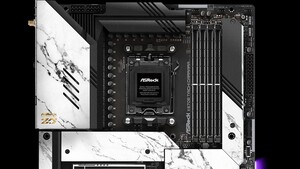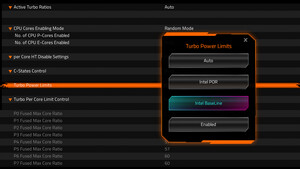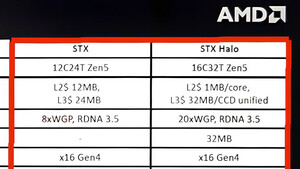Pizza! schrieb:
Ich hab beim 13700K E Cores off gemacht und der Verbrauch im Idle ging deutlich hoch, weiß nicht mehr wie viel.
Außerdem kauft man ja kein 600-700 Euro Monster und deaktiviert dann die halbe CPU.
Als hätte man mit einem 14900K irgendwelche Leistungsprobleme...
Ah ok, danke hatte dies noch selbst nicht getestet, macht aber auch sinn, die P-Cores werden wohl den Löwenanteil des Stroms ausmachen.
Wenn die natürlich höher ausgelastet werden und dauerhaft ggf. nicht im Sleep sind dann kann das vermutlich wie du schon sagst mehr ausmachen.
Natürlich kauft man die nicht um was zu deaktivieren, aber mir ging es primär auch um Min/Max FPS zu pushen bzw. ggf. die beste Einstellung für eine möglichst saubere Frametime - insofern man dies noch mit der CPU beeinflussen kann.
Natürlich hat man keine Leistungsprobleme... aber ey, wir sind hier bei CB, die Hardware ist auch Stückweit zum rumprobieren/basteln da, wir sind ja wohl keine Normalen Consumenten....
Sofern die Einstellung in >90% Fälle bessere Performance liefern würde, würde ich ggf. auch den Verbrauch mal hinten anstellen, mir persönlich wäre mehr Strom für bessere Performance def. das wert^^.
Pizza! schrieb:
Was aber erst jetzt mit dem APO Tool besser funktionert. Im Grunde macht es ein paar Sachen so ähnlich wie die Prio bei den 7900X3D und 7950X3D CPUs, wo Gaming auf die wichtigen Kerne gezwungen wird.
Wobei man sagen muss, dass es bei diesen X3D CPUs schon mager funktioniert ohne Software bzw. gar nicht.
Und da sehe ich den Vorteil an Intels Lösung, die kann schon gute Ergebnisse abliefern, ohne dass noch nachjustiert wird.
Wenn nachjustiert wird sieht es noch besser aus.
Den Hardwareseitigen Thread Director halte ich deshalb schon für sinnvoll, was in Hardware gegossen ist, ist meist auch weniger anfällig wie eine reine Softwarelösung....
BoggledBeagle schrieb:
The process these CPUs are made on is not good for 6 GHz. The idea of torturing all cores at 6 GHz is horrific.
Try to run the CPU at frequencies which the silicone can handle well, for example limit P cores to 5 and E cores to 4 GHz. You will get a completely different, cool and efficient CPU.
I´m aware of this.
But I don´t need the most efficient CPU - performance is the relevant factor for me.
6GHz @ moderat Voltages and optimal cooling does not harm the CPU.
You do know that the 14900K is boosting normally to 6GHz when slightly loaded?
Allcore 6GHz @ P-Cores is possible, only requires long testing for stable OC....



